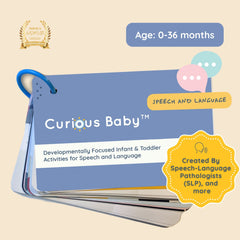As parents, we all want to make sure our children pass the milestones they're expected to at the proper age. But when learning about different types of learning delays, how do you appropriately decipher which is which? This can be difficult for parents, particularly regarding speech and language skills. So, how do we identify speech or language delays, determine which one our little one may have, and address the issue?
What is a Speech Delay?
To begin, we need to understand what the term 'speech' means when it comes to speech and language development. In this context, speech refers to the verbal expression of language. In simpler terms, speech is the way we make sounds using our lungs, vocal cords, tongue, mouth, and teeth. We utilize speech skills in the formation of words and sounds.
A speech delay is also known as alalia and describes a delay in utilizing the parts of our body required to create sounds or form speech. Children with speech delays are often able to understand the words being said to them but struggle with using the mechanisms required to produce sounds or words.
What Are the Signs of a Speech Delay?
Detecting signs of a speech delay typically happens earlier in your little one's life than detecting problems like language delays. This is because your little one will practice speech more overtly than they'll practice language early on in life.
As your little ones age, you'll want to keep an eye out for them, making and mimicking sounds they hear. Eventually, they'll begin to babble in "baby talk" before they begin integrating true words with their babble.
What is a Language Delay?
In contrast, language is the way we provide and receive information. Language involves how we understand and are understood by others (whether verbal, nonverbal, or written communication). A child with a language delay may be able to form sounds and even words but cannot use those words in a meaningful way to communicate. Children with language delays often have difficulty understanding received communication, leading to frustration for both the child and parents. Knowing when to intervene if you suspect your child is dealing with a language delay and getting help as soon as the delay is recognized can help lessen frustration and stress for parents and children alike.
What Are the Signs of a Language Delay?
While signs of language delay can be a bit more difficult to detect, picking up on these potential signs of language delay is possible early in your baby's development.
For instance, babies should be non-verbally communicating with the world around them from a young age. They should be able to point to objects in the room, like a light, fan, or toy. As they age, they should be able to comprehend and follow simple instructions and perform simple actions based on those instructions.
What Can Parents Do?
Utilize Infant-Directed Speech
How we talk to our infants has a big impact on how they learn about speech and language. Speaking to your baby in a slow cadence with a higher pitch is a great way to assist them in language development.
Read Together
Reading with your child is great for many different reasons. Not only does it teach them to understand language as you read to them, but it helps them master skills like pronunciation. Children also learn to associate objects with the words that represent them through reading and picture books.
Talk Through Your Actions
Talking to your baby throughout the day is another great way to expose them to speech and language skills. Talk them through what you're doing as you go about your day.
Play Repeat
Once your little one starts trying to say words on their own, repeat those words after they say them. This helps them practice the way the words they're saying are pronounced. If your little one uses words incorrectly in a sentence, simply repeat their sentence back to them, substituting the correct word.
Talk to Professionals About Speech and Language Delays
Parents have a ton of different options when it comes to encouraging speech and language development in their children. From talking with your child to reading, and even utilizing special speech and language activity cards, like those from Curious Baby. These cards are designed to help foster development among children when it comes to speech and language skills. Developed with professionals like pediatricians, therapists, and speech and language professionals, these cards are designed with your little one in mind.
Last but certainly not least, remember that all children develop at a different rate and in different ways. All milestones are not the same, and all children learn at their own pace, so do your best not to compare your little one to the children of friends or family. Your baby is unique, and their learning habits are, too!










Leave a comment